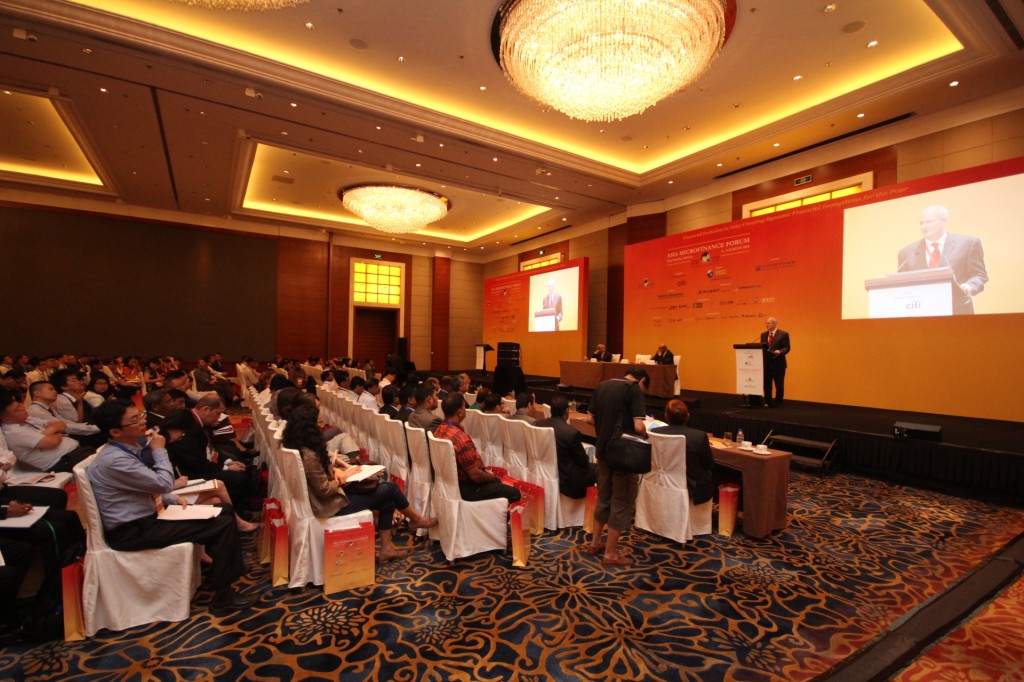Asia Microfinance Forum 2014: Opening Session
Microfinance Focus, 5 August 2014 – 9:00 to 10:30 CST: The well-attended opening session at the Asia Microfinance Forum began with welcome remarks from Mr. Chandula Abeywickrema, the Chairman of the Banking with the Poor Network (BWTP).
He was followed by Mr. Duan Yingbi, the President of the China Foundation for Poverty Alleviation (CFPA). Mr. Yingbi noted that there are currently over 300 MFIs in China, and that the boom in sustainable microcredit and commercial companies with rapid growth in his country first began in 2005. Commercial banks in China are very active, with an average size of $3.2 billion in US dollars.
Yingbi noted that the MFI industry is ill-defined in China and that has led to an occasionally poor response by the central government, leading to a “chaotic” state for the industry. Per Yingbi, China’s most pressing issue in the MFI sector is a lack of institutions aimed at impoverished groups in rural areas – but he noted that market space for a greater variety of MFIs does exist.
Last to address the audience for welcome remarks was Ms. Zhang Rui of the Financial Institute of the People’s Bank of China. Ms. Rui described China’s national development strategy for finance, in which small banks have become the guiding force for small lending projects. She also noted that the Chinese financial industry currently needs to agree upon industry measurements and methodology.
They keynote panel was begun by Sir Fazle Hasan Abed, the Founder and Chairperson of BRAC. Mr. Abed noted that the Bangladesh microfinance industry has gone through a “transition” which he described in his address.
“The World Bank President said the other day that the next Millennium Agenda for sustainable development should include the eradication of extreme poverty,” said Sir Fazle in his address. “I hope that some of the experience we have gathered over the years in providing the ultra poor with the support to graduate out of extreme poverty will help.”
“New technology is bringing opportunities for reaching areas and clients that were unreached before,” said Sir Fazle, describing BRAC’s efforts to use mobile technologies in Bangladesh to reach undeserved communities – including loans and savings products.
Sir Fazle noted that regulators face a difficult balancing act in terms of facilitating innovation in the MFI sector while ensuring client protection. “We need to understand the diversity of financial needs that necessitates complex interventions by MFIs,” he said, noting the benefits of a diverse financial ecosystem.
“Everyone of us, rich and poor, grows up with a financial aspiration,” said Sir Fazle in closing. “Let us use this opportunity to work together towards a system in which the attainment of such aspirations is not reserved for the fortunate few, but is a reasonable expectation for all.”
Mr. Bob Annibale, Global Director of Citi Microfinance and Community Development spoke next, stressing the need to consider the diverse needs of the world poor while developing an inclusive financial ecosystem.
“It is important to realize that the poor are no more homogenous than the rest of society” said Annibale, who stressed considering the diverse needs of many groups when constructing inclusive and appropriate financial ecosystems, including refugees, migrant workers, older women, and others.
Annibale described “closing the gap” between the poorest populations served by microfinance, and the working poor and lower-income salaried workers, who often have had limited access to appropriate financial services – an effort that he said would require the combined efforts of a wide range of institutions.
He described the two phenomenons of urbanization and digitization – the shift in population from rural to urban across Asia, and the ever-increasing rise of mobile technology and other connectivity services.
“It gives us platforms for inclusion and lower cost,” said Annibale of mobile and digital technology. “It doesn’t replace judgment and financial capability.”
Finally, Annibale discussed globalization, including the “key issue” of immigration – which entails the movement of money and the rise of remittances in import in the world financial sector. “Regulators need to be creative and bring with them all kinds of innovation,” he noted.
“We all need to feel that microfinance is the starting point of a much wider goal of financial inclusion, but we must bring others with us along the way,” said Annibale in his closing remarks.
Stay tuned for more information on Wednesday’s plenary session on China, focusing on the state of the microfinance industry and the way forward.






Great blog reporting !
I agree with James Sparks (Mr.) Good reporting. Real time too!
Best wishes!